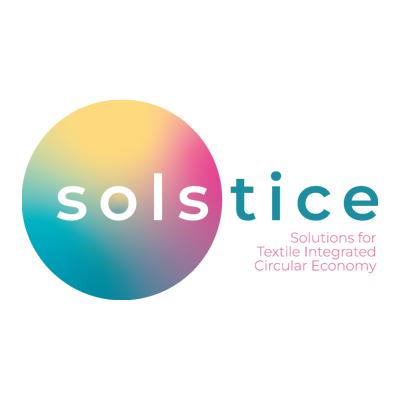SOLSTICE - Innovative 5R SOLutionS for Textile Integrated Circular Economy
Updated on 02.12.2024
SOLSTICE aims at demonstrating 4 replicable systemic solutions for the territorial deployment of the circular economy for the major industrial sector of textiles (62Mt produced/year). All steps of waste prevention and management will be included in a 5R strategy: Refuse/Reduce, Reuse, Repair, Repurpose, Recycle. The solutions developed can be replicated and cross-linked with the plastics value chain.

Leading organisation/partner
Axel’One
Cities involved
Prato (Italy) Berlin (Germany), Grenoble (France)
Regions involved
Catalonia (Spain)
Territorial clusters involved
Prato (Italy) Berlin (Germany), Grenoble (France), Catalonia (Spain)
Scope and objectives
SOLSTICE addresses key social and technical challenges within the textile industry. Through active demonstration in four European regions, the project showcases the implementation of climate-neutral practices and the transition towards a circular economy specifically tailored for the textile sector. Our comprehensive approach encompasses all stages of waste prevention and management, guided by a holistic 5R strategy: Refuse/Reduce, Reuse, Repair, Repurpose, and Recycle.
SOLSTICE will thus:
• Develop tools and strategies to implement the 5R approach:
For the 4R Refuse/Reduce, Reuse, Repair, Repurpose:
- Engage the different stakeholders (industrial companies, local authorities, citizens) to revise their supply chains / behaviour, and become more sober, circular and sustainable.
- Scope and map current state, carry research on and analysis of relevant circular interventions per territory,
- Create a methodology and blueprints of CEC interventions to be tested/piloted
- Define circular guidelines and indicators
Recycle: Demonstrate innovative chemical recycling technologies, able to treat efficiently part of the major streams of polymers in textiles and plastics (PET, elastane, polyamide, polyurethane) in mild conditions. The technologies allow to recycle multicomponent and bio-based materials, complex streams, and to recycle textile into textile or coating into coating (closed-loop) or into added-value applications (open loop). They are easily adaptable and allow a local recycling.
• Set-up a traceability system based on a Digital Product Passport and designed in relation to existing initiatives.
Key services provided by the project
The project will carry out a status quo analysis in each of the four targeted territories. Territory profiles will be determined and associated with appropriate action plans to guide the implementation of appropriate infrastructure and communication. A final report will detail the outcomes, successes, challenges, and recommendations for the future.
The project will actively support policy replication by producing a policy brief, disseminating the project results in different networks the regions are part of.
The key services provided will be studies and dissemination.
Key deliverables
The deliverables foreseen are the following:
- Territory profiles for each of the 4 participating ones – key findings (WP2, M10)
- Report on the actions and impacts for the 4Rs in each territory – second year of piloting (WP3, M37)
- Compiled summary of key insights and recommendations for a better uptake and scaling of the 5Rs (WP3, M27, updated M40)
- Global circularity assessment for the 4R strategies (WP6, M42)
- TEC has developed the first version of a tool that enables to calculate the cost structure of each step of a global process. SOLSTICE will deliver a demonstration of the tool on the global value chains for 4 blends (WP6, M42)
- Mapping of the cities and regions, as well as polymers and applications, for replication – final (WP7, M41)
- Blueprints of CEC interventions based on results of piloting, that can be replicated/ scaled (WP7, M39)
- Two policy briefs (WP7, M18 and M39)
- Two videos (WP8, M9 and M40)
- 4 events (one in each of the 4 piloting regions) (WP8, between M18 and M33)
- SOLSTICE final conference (WP8, M42)
Description of future collaboration with CCRI-CSO
- Actively attend in CCRI events / organise common events
- Participation in Working Groups
- Sharing knowledge and practices developed in SOLSTICE with CCRI pilot and fellow cities, regions and their groupings
- Contribution to CCRI website
- Participation in activities organised jointly with other EU projects and CCRI
Participants
NEXT TECHNOLOGY TECNOTESSILE SOCIETA NAZIONALE
ASSOCIATION TECHTERA AUVERGNE RHÔNE ALPES
UNIVERSITE LYON 1 CLAUDE BERNARD
CIRCULAR CITY - ZIRKULARE STADT EV
SPIN-PET
GRENOBLE-ALPES-METROPOLE METRO
ALIA S.P.A.
Polymeris
DEUTSCHE INSTITUTE FUR TEXTIL- UND FASERFORSCHUNG DENKENDORF
ACONDICIONAMIENTO TARRASENSE ASSOCIACION
RECYC ELIT SAS
PELLENC SELECTIVE TECHNOLOGIES
COMUNE DI PRATO
INDRESMAT SL
PLATE-FORME TECHNOLOGIQUE EUROPEENNE POUR LE FUTURE DU TEXTILE ET DE L'HABILLEMENT
STICHTING CIRCLE ECONOMY
CONFEDERACION DE LA INDUSTRIA TEXTIL ASOCIACION
CROMOGENIA UNITS SA
LYON INGENIERIE PROJETS
Departament d'Acció Climàtica, Alimentació i Agenda Rural
INSTITUT FRANCAIS DU TEXTILE ET DE L'HABILLEMENT
FUCHSHUBER TECHNO-TEX GmbH
DENGE KIMYA VE TEKSTIL SANAYI TICARET ANONIM SIRKETI




